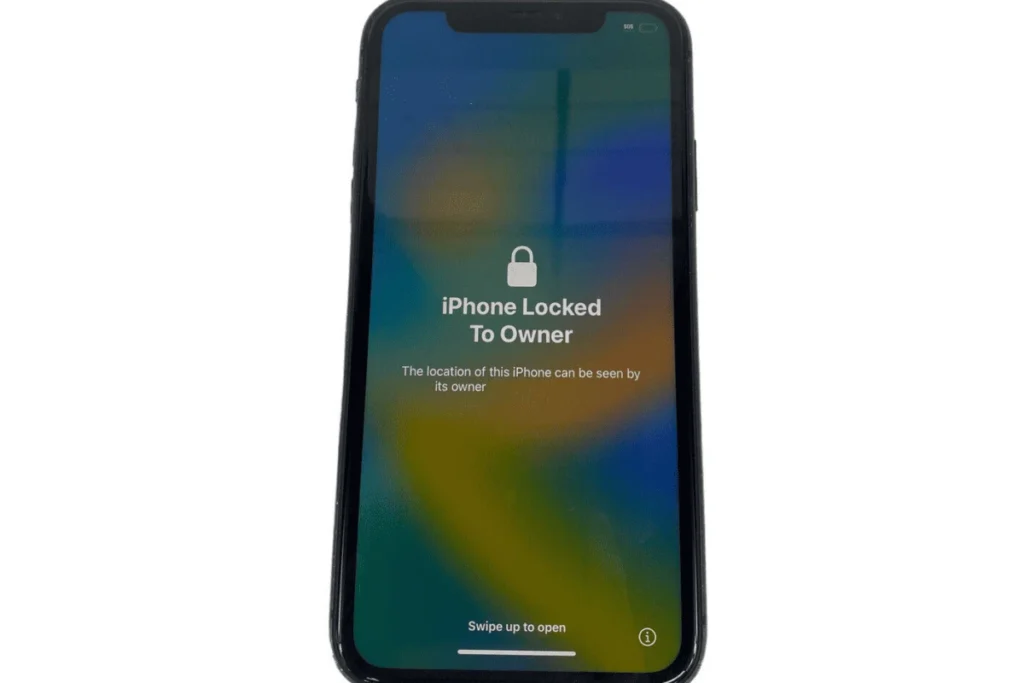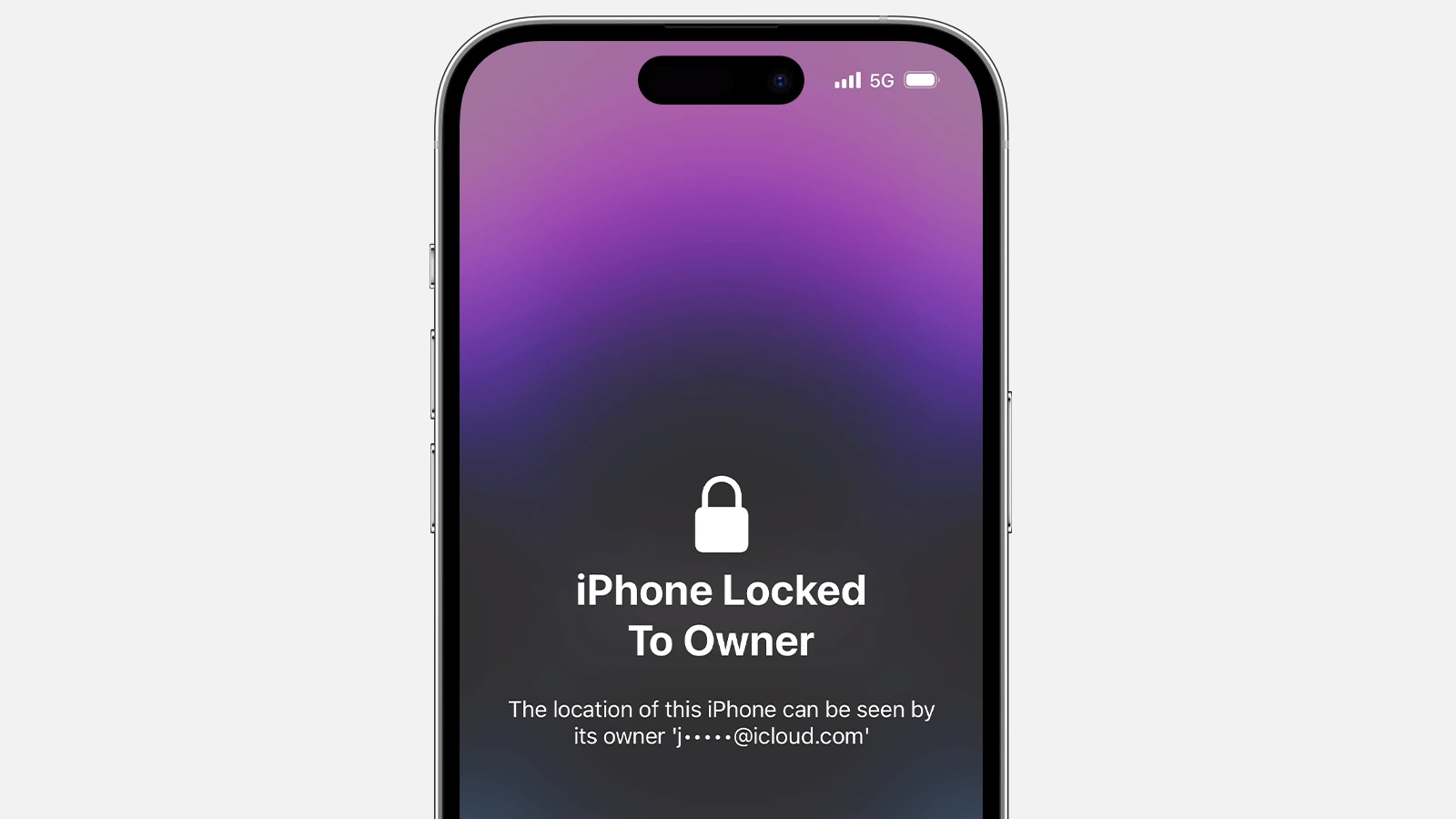If you bought a phone from Facebook Marketplace, Craigslist, or an unofficial source and it shows a message that says “There Is A Problem With Your iPhone” or “iPhone Locked to Owner” it may be a stolen or ICloud locked phone. This is a serious problem. First, if possible, try to get a refund or report the charge to your payment institution if you used a digital payment. There are many scammers on Facebook Marketplace and other online buy/sell sites who try to sell stolen items at prices below the market value. If a deal seems too good to be true, it probably is.
Lost or Stolen Phone? Steps to Take and What to Expect
A blocked or reported stolen phone can be a major inconvenience, but there are steps you can take to address the situation.
Understanding the Block: Lost vs. Stolen
First, it’s important to distinguish between a lost phone and a stolen one. If you simply misplaced your phone, contacting your carrier to temporarily suspend service might be sufficient. However, if your phone was stolen, you’ll need to report it to both your carrier and law enforcement.
Reporting a Stolen Phone
| Step | Action |
|---|---|
| 1 | Contact Your Carrier: Report your phone as stolen to your wireless provider (e.g., Verizon, AT&T, T-Mobile). They will blacklist the device, preventing it from being used on their network. |
| 2 | File a Police Report: Provide the police with your phone’s IMEI number (a unique identifier). This can help track the device if it’s recovered. |
| 3 | Change Passwords: Change passwords for any accounts linked to your phone, such as email, social media, and banking apps. |
| 4 | Contact Your Insurance Provider: If you have phone insurance, file a claim to potentially get a replacement device. |

Unblocking a Recovered Phone
If you find your lost phone or it’s recovered after being stolen, you can contact your carrier to unblock it. This usually involves verifying your identity and ownership of the device.
Challenges and Considerations
- Permanent Block: If a phone is repeatedly reported stolen, it might be permanently blocked, making it unusable on any network.
- Data Loss: If you haven’t backed up your data, you might lose photos, contacts, and other information stored on the stolen phone.
Remember, prevention is key. Keep track of your phone, use a strong passcode, and consider installing a tracking app to help locate it in case of loss or theft.
How to Fix Blocked or Stolen Phone
| Situation | Actions | Important Considerations |
|---|---|---|
| Phone Reported as Lost or Stolen | * Contact Your Carrier:** Immediately report the situation to your wireless provider. They can block service and potentially blacklist the IMEI. | * IMEI Blocking:** Blacklisting the phone’s unique IMEI (International Mobile Equipment Identity) prevents it from being used on most networks. |
| * File a Police Report:** Go to your local police station and file a report. This provides important documentation for insurance claims and may help with recovery. | * Proof of Ownership:** Be prepared with the original proof of purchase or other documentation linking you to the device. | |
| * Check “Find My” Services:** If you had “Find My iPhone” (Apple) or similar tracking services enabled, attempt to locate your phone. | * Remote Lock/Wipe:** These tracking apps often allow you to remotely lock or erase your phone’s data. | |
| IMEI Block (Not necessarily stolen) | * Contact Original Carrier:** If the phone was purchased used and blocked due to non-payment, start with the original carrier. | * Proof of Ownership:** You’ll likely need to show you are the rightful owner and not associated with any outstanding debt on the device. |
| * Unlocking Services:** Use caution here. Reputable unlocking services may exist, but there are also scams. Thoroughly research any company you consider. | * Legality:** Ensure any unlocking method doesn’t violate your carrier agreement or local laws. |
There is a small chance that the IMEI has been blacklisted for a reason other than the phone being stolen though so the first step is to try to reach out to the person who sold it to you and see if they can resolve the issue with their carrier / insurance company.
If the phone ends up being stolen, however, you likely won’t be able to contact the seller again and nearly nothing can be done. In that case you might want to return the phone back to the carrier so that they can at least get it back to the rightful owner.
Key Takeaways:
- If your phone is blocked or reported stolen, you may not be able to make calls or use data due to a blacklisted IMEI number or activation lock.
- A blocked or reported stolen phone can be fixed by contacting the carrier, reporting to the police, or checking for unpaid bills or contract issues.
- To prevent your phone from being blocked or reported stolen, keep track of your phone, protect it from theft, and be aware of scams and fraudulent activities.
What Does it Mean When a Phone is Blocked or Reported Stolen?
When a phone is blocked or reported stolen, it signifies that the device’s IMEI has been restricted from accessing mobile networks due to security concerns.
IMEI blocking plays a crucial role in combating the rising issue of phone theft. The act of IMEI blocking not only hinders the thief’s ability to use or sell the stolen device but also acts as a deterrent for potential thieves. From a legal standpoint, using a phone that has been reported stolen or blocked is considered a criminal offense in many jurisdictions. Engaging in such activities can lead to severe penalties, including fines and possible jail time. The implementation of IMEI blocking has contributed significantly to reducing the black market for stolen phones, thereby enhancing overall mobile device security.
Why Would a Phone be Blocked or Reported Stolen?
A phone may be blocked or reported stolen due to instances of theft or fraudulent activities, leading to the blacklisting of the device’s IMEI and rendering it unusable or restricted.
When a phone is stolen, it not only causes inconvenience to the owner but also poses a serious security risk. Thieves often target phones for their resale value or to access sensitive personal information stored on them. This is why it’s crucial to take preventive measures such as setting up passcodes, enabling tracking features, and being cautious in public spaces.
Buying or selling stolen phones can have legal consequences, as it contributes to the perpetuation of theft crimes. Purchasing stolen devices may result in them being blocked by the rightful owners or authorities, leaving the buyer at a loss and with a useless device.
IMEI blocking plays a pivotal role in deterring phone theft by making it harder for thieves to profit from their unlawful activities. It serves as a deterrent and a method of tracking stolen phones, helping to reduce the incentive for theft in the first place.
Lost or Stolen Phone
Losing or having a phone stolen can result in the device being blocked or reported, especially if the IMEI is used to track or blacklist the device for security reasons.
Once a phone is lost or stolen, the owner may face a plethora of challenges. From losing personal data and important contacts to the fear of unauthorized access to sensitive information, the repercussions can be significant. By utilizing the unique identification number, IMEI, authorities can trace the device’s whereabouts and take necessary actions to safeguard user privacy. Reporting the loss or theft of a phone with the IMEI can aid in preventing misuse and unauthorized activities with the device, offering a layer of security and peace of mind to the owner.
Protecting Your Phone: Tips to Prevent Theft
| Tip | Why It Matters |
|---|---|
| Enable “Find My” features (or similar tracking apps). | If your phone is lost or stolen, this helps you locate it, or remotely lock and erase data. |
| Set strong passwords for your phone AND important accounts. | Avoid birthdays or obvious patterns. Hackers often try these first. |
| Be aware of your surroundings, especially in crowded areas. | Thieves look for easy opportunities. Keep your phone secure, not out in plain sight. |
Unpaid Bills or Contract Termination
Failure to pay bills or terminating a contract abruptly can lead to the device’s IMEI being blocked or reported as stolen by the carrier or service provider.
When a user defaults on payments or cancels a contract without settling outstanding dues, the service provider has the authority to take actions to safeguard their interests. One of the measures they can implement is to block the IMEI of the device, rendering it unusable on their network. This not only restricts the individual from using the phone for communication but also serves as a deterrent to prevent fraudulent activities. The IMEI status can be updated in a shared database used by various service providers, which may result in the device being blocked across multiple networks.
Fraud or Scamming
Engaging in fraudulent activities or falling victim to scams can result in a phone’s IMEI being flagged as compromised or involved in illegal activities, leading to blockage or theft reports.
Phone fraud and scams can have detrimental effects beyond just financial loss. When an individual’s IMEI is associated with fraudulent behavior, the repercussions can extend to legal consequences such as fines and even prosecution. The tainted IMEI can lead to a tarnished reputation and trust issues in personal and professional interactions. Not only does it risk the security of personal data stored on the device, but it also invites the possibility of becoming entangled in criminal investigations due to the compromised integrity of the IMEI. Protecting one’s IMEI from fraud and scams is crucial to avoiding these severe outcomes.
What Happens When a Phone is Blocked or Reported Stolen?
When a phone is blocked or reported stolen, users may experience service suspension, inability to make calls or access data, and restrictions on using the device until the issue is resolved.
In cases where a phone’s IMEI is blocked, it essentially renders the device useless on most networks, making it impossible for the user to connect to any cellular services. This means no calls, text messages, or internet access, ultimately leading to a disconnected experience.
If the phone is reported stolen and the IMEI is blacklisted, not only does the rightful owner suffer from service disruptions, but the unauthorized person in possession also faces a crippled device, unable to utilize most features.
Inability to Make Calls or Use Data
IMEI blocking can result in the inability to make calls or use data services, as the device is prevented from connecting to GSM networks for communication.
When an IMEI is blocked, the phone essentially becomes unable to communicate with the mobile network infrastructure. This block is imposed as a security measure against theft or misuse of devices. As a consequence, activation issues may arise, hindering the user’s ability to register their device on the network and access essential services. Without a valid IMEI, the phone is restricted from functioning on GSM networks, limiting its capabilities. This restriction can have a significant impact on the device’s usability and overall communication experience.
Blacklisted IMEI Number
A blacklisted IMEI number signifies that the device has been reported stolen or involved in illegal activities, requiring ESN cleaning services to restore its functionality and remove the block.
Once an IMEI is blacklisted, it essentially becomes unusable on any network. This poses significant challenges for the device owner, as they are unable to make calls, send texts, or access data services. ESN cleaning services offer a solution by removing the blacklisting status from the device’s IMEI, allowing it to be operational again. By availing of these services, individuals can regain the full functionality of their device without having to invest in a new one.
Phone Lock or Activation Lock
IMEI blocking may lead to the activation lock or phone lock being enabled, restricting unauthorized access to the device and requiring specific unlocking procedures.
When IMEI blocking is implemented, it serves as a crucial security measure to safeguard your device’s data and protect your privacy. The activation lock feature ensures that even if the phone falls into the wrong hands, the rightful owner is required to confirm their identity before accessing the device. Phone lock mechanisms prevent unauthorized users from tampering with your personal information by locking the device until the correct unlocking process is completed. These security protocols add an extra layer of protection to your smartphone, making it more challenging for potential thieves to misuse your data.
Can a Blocked or Reported Stolen Phone Be Fixed?
A blocked or reported stolen phone can potentially be fixed through procedures such as contacting the carrier, reporting to the police, or resolving unpaid bills or contract issues to restore its functionality.
Once the necessary steps are taken to address the blockage or theft report, the next phase usually involves the phone restoration and reactivation process. This typically includes contacting the original service provider to verify ownership and explain the circumstances of the blockage. If the issue stems from unpaid bills, settling the outstanding payments is crucial to unlock the device. Reporting the theft to the authorities not only helps in recovering the device but also assists in preventing further illicit use.
After the blockage or theft report is resolved, it’s essential to ensure that the phone’s unique IMEI number is not tampered with or altered. Authentic IMEI numbers are vital for lawful usage of devices and for tracking purposes in case of future incidents. In some instances, the service provider may require proof of purchase or other documentation to finalize the reactivation process, underscoring the importance of keeping records of phone acquisitions.
Contacting the Carrier
Contacting the carrier is a common step in fixing a blocked phone, as they can assist in verifying ownership, addressing IMEI issues, and facilitating the reactivation of the device.
When a phone is blocked due to an invalid IMEI, reaching out to the carrier becomes essential. The carrier plays a crucial role in not only verifying the authenticity of the device but also ensuring that it is reactivated securely and efficiently. By collaborating with the carrier, users can expedite the resolution process and regain access to their device seamlessly. IMEI verification is a key step in this process, as it establishes the device’s legitimacy and ownership status, preventing unauthorized access or misuse.
Reporting to the Police
Reporting a stolen phone to the police is crucial for documenting the theft, aiding in recovery efforts, and potentially resolving IMEI blockage issues through legal channels.
When individuals report a stolen phone, they not only contribute to the official documentation of the crime but also enable law enforcement to initiate investigations and potentially locate and recover the device. Involving the police in these cases plays a vital role in following up on leads, tracking down suspects, and leveraging their expertise in handling stolen property cases.
In addition, police reports provide essential details that can aid in seeking insurance claims and executing legal actions against perpetrators. By registering the stolen phone’s IMEI number with law enforcement, individuals increase the chances of recovering the device if it resurfaces or preventing its illicit use through IMEI blockage mechanisms.
Checking for Unpaid Bills or Contract Issues
Ensuring there are no outstanding bills or contract disputes is essential for resolving IMEI blockages, as unpaid bills or contract issues can lead to service restrictions on the device.
Regarding addressing financial obligations, timely payments play a crucial role in maintaining a seamless mobile experience. Failure to settle bills can result in disrupted communication services and hinder functionality. Without clear contractual terms adhered to, the risks of encountering disputes that could ultimately lead to IMEI blocks significantly increase. It’s imperative to maintain clear communication with your service provider and seek resolution for any outstanding debts to prevent potential device lockouts and service interruptions. By proactively managing bill payments and addressing contract discrepancies, users can ensure a hassle-free mobile usage experience.
How to Prevent a Phone from Being Blocked or Reported Stolen?
Preventing a phone from being blocked or reported stolen involves utilizing IMEI checking services, participating in phone buyback programs, and implementing theft prevention strategies to safeguard the device.
A crucial step in safeguarding your device is regularly checking the IMEI number to ensure it has not been blacklisted due to theft. IMEI checking services can quickly verify the status of your phone, helping you detect any suspicious activity early on.
Engaging in buyback programs offered by reputable companies not only provides a safe way to dispose of old devices but also reduces the risk of them being sold on the black market, decreasing the chances of theft.
Adopting theft prevention practices like setting up passwords, enabling remote locking and wiping features, and avoiding leaving your phone unattended in public places can significantly lower the risk of theft or unauthorized access.
Keep Track of Your Phone
Tracking your phone’s IMEI, activating location services like Find My, and maintaining awareness of its whereabouts are essential steps in preventing theft or loss.
By regularly checking your device’s IMEI details, you can ensure that unauthorized access or tampering is promptly identified, reducing the risk of theft.
Location tracking features such as GPS technology and Wi-Fi positioning can significantly aid in pinpointing the exact location of your phone in case it goes missing. Utilizing tools like the Find My app or other similar services enhances the chances of retrieving your device.
Remember to stay vigilant about your phone’s location and avoid leaving it unattended in public places to minimize the chances of it being stolen or misplaced.”
Protect Your Phone from Theft
Safeguarding your phone involves securing it from theft, avoiding transactions involving stolen goods, and implementing security measures like passcodes to deter unauthorized access.
Regarding preventing phone theft, it’s not just about physical security measures but also about being cautious with whom you share your device’s information. One effective strategy is to activate Find My Device services, which can help trace and recover a stolen phone. Regularly backing up your data to a secure cloud storage ensures that even if your device gets stolen, your important information remains safe. It’s crucial to stay vigilant and updated on the latest security protocols to stay one step ahead of potential threats.
Be Aware of Scams and Fraudulent Activities
Staying informed about potential scams, avoiding fraudulent transactions on online buy/sell platforms, and verifying IMEI details before purchase are crucial steps in preventing phone-related fraud.
Phone scams have become increasingly sophisticated, making it important for consumers to be vigilant when making digital transactions. Verifying the International Mobile Equipment Identity (IMEI) number is a key element in ensuring the authenticity of a device before sealing the deal. Scammers often manipulate IMEI details to deceive buyers, leading to financial loss and compromised personal information. By conducting thorough research, cross-checking details, and staying wary of too-good-to-be-true offers, individuals can significantly reduce the risks of falling victim to phone fraud.
Frequently Asked Questions
Can a blocked or reported stolen phone be fixed?
Yes, in most cases a blocked or reported stolen phone can be fixed. It depends on the reason for the block or report and the steps taken to resolve the issue.
What should I do if my phone is blocked or reported stolen?
If your phone is blocked or reported stolen, you should contact your service provider immediately. They will be able to provide further guidance on what steps to take.
How do I know if my phone is blocked or reported stolen?
You will typically receive a notification from your service provider if your phone is blocked or reported stolen. You may also notice that you are unable to make calls or access certain features on your phone.
Can I still use my phone if it is blocked or reported stolen?
No, if your phone is blocked or reported stolen, you will not be able to use it. This measure is put in place to prevent unauthorized use of the device.
What steps should I take to prevent my phone from being blocked or reported stolen?
To prevent your phone from being blocked or reported stolen, make sure to keep it in a safe and secure place at all times. Also, avoid sharing personal information and login credentials with others.
Is it possible to unblock a phone that has been blocked for non-payment?
Yes, if your phone has been blocked for non-payment, you can work with your service provider to resolve the outstanding balance and have the block lifted. However, this may involve additional fees and charges.







